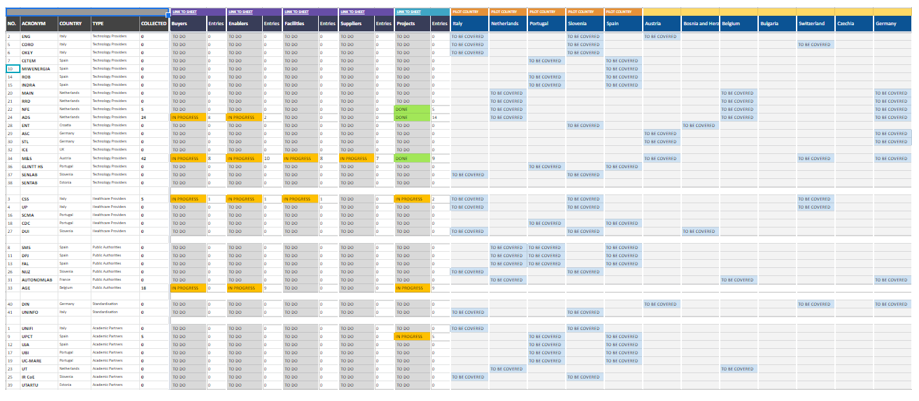
11 Jun MAGDA: Comprehensive analysis of market strategies and business models
In an era of seemingly unpredictable climate, MAGDA transforms weather-risk management with near real-time, high-resolution atmospheric data. It combines technological advancement with sustainable practices, offering precise water management and crop protection. MAGDA optimises and disseminates significant results from its research, ensuring societal and market benefits through a comprehensive exploitation strategy, prioritising impactful innovations.
Market analysis has identified a significant demand for advanced meteorological tools, particularly in regions grappling with water management challenges and the impacts of climate change. MAGDA’s cutting-edge approach is well-positioned to address these needs, offering a versatile and scalable solution for a wide range of agricultural stakeholders. According to our thoroughly conducted analysis, the market trends indicated a shift towards technology-driven agriculture and there is significant potential for growth, particularly in regions adapting to the challenges of climate change and water management.
Patent trend analysis
The patent trend analysis for the MAGDA project highlighted the progression of technological advancements in agriculture. The analysis examined patents related to GNSS, drones, and remote sensing. Findings indicated a significant rise in patents over the past decade, with “smart agriculture” leading with over 2000 publications per year [1], [2]. This trend reflects growing innovation and market interest, crucial for the future of precision farming and sustainable agriculture.
Market analysis
The market analysis conducted for the MAGDA project highlighted the growing demand for advanced meteorological tools in agriculture, driven by climate change and the need for efficient water management. Utilizing state-of-the-art technologies, MAGDA integrated satellite, drone, and ground-based observations with multi-constellation GNSS systems, offering high-resolution data crucial for modern farming practices. Key insights from the analysis included:
- There is a significant demand for improved weather forecasting and irrigation management tools, particularly in regions facing water scarcity and extreme weather conditions.
- MAGDA’s unique combination of GNSS, drones, and remote sensing technology provided a comprehensive solution for real-time atmospheric monitoring, setting it apart from existing market offerings.
- Collaboration with governmental bodies, private entities, and academic institutions was central to MAGDA’s strategy, enhancing technological refinement and market relevance.
- The global smart agriculture market, valued at $20.30 billion in 2022, was expected to grow at a CAGR of 13.4%, while the precision farming market was projected to grow from $9.7 billion in 2023 to $21.9 billion by 2031 [3].
MAGDA’s innovative approach positioned it to meet the challenges of modern agriculture, offering scalable solutions that enhanced productivity and sustainability.
Technology mapping
The technology mapping for MAGDA offered a detailed representation of the diverse technological components integrated into the project and their interconnections. This comprehensive analysis highlighted how MAGDA leveraged advanced technological solutions to enhance agricultural decision-making through improved weather forecasts and irrigation advisories.
Exploitation strategy and current outcomes
Throughout various strategic phases, several key exploitable results were identified. These results were meticulously rated based on their innovation, exploitability, and market relevance potential, ensuring that the most promising technologies were prioritized.
Strategic partnerships and collaborations were integral to MAGDA’s exploitation strategy. By aligning with governmental bodies, private entities, and academic institutions, the project aimed to refine its technological offerings and maintain market relevance. These collaborations were pivotal in navigating regulatory landscapes, enhancing technological developments, and facilitating market penetration.
Innovation and adaptability remained central to MAGDA’s business strategy. The project was not only focused on technological advancements but also on establishing a strong market presence through effective penetration strategies. This included integrating emerging technological paradigms, such as machine learning and AI-based advisories, to stay ahead of the competitive market.
Overall, MAGDA’s exploitation strategy provided a structured and professional approach to achieving commercial success and market impact. By emphasizing technology integration, market readiness, and strategic collaborations, MAGDA positioned itself as a leader in the realm of advanced agricultural meteorology.
References
[1] Balafoutis, A. T., Evert, F. K. V., & Fountas, S. (2020). Smart farming technology trends: economic and environmental effects, labor impact, and adoption readiness. Agronomy, 10(5), 743.
[2] Dhanaraju, M., Chenniappan, P., Ramalingam, K., Pazhanivelan, S., & Kaliaperumal, R. (2022). Smart farming: Internet of Things (IoT)-based sustainable agriculture. Agriculture, 12(10), 1745.
[3] “Smart Agriculture Market Size, Share, Growth Drivers, Industry Report, 2031,” MarketsandMarkets, Mar. 2023. [Online]. Available: https://www.marketsandmarkets.com/Market-Reports/smart-agriculture-market-239736790.html [Accessed: Dec. 10, 2023].
Links
https://www.youtube.com/@MAGDA-Project
https://www.linkedin.com/in/magda-project/
Keywords
market analysis, business model, patent analysis, meteorological tools, climate-impacted agriculture, atmospheric data

